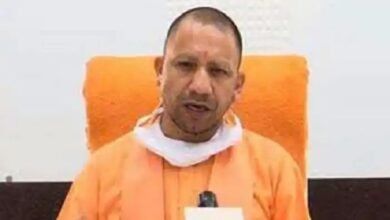[ad_1]

Union Environment Minister Bhupender Yadav speaks during a plenary session at the COP28 UN Climate Summit in Dubai on December 9, 2023. (AP)
India has consistently emphasised that developed countries must take the lead in climate action, since they are responsible for the majority of the historical emissions
India has reiterated its call for equity and climate justice at the UN Climate Summit being held in the oil-rich UAE. The two-week long conference has reached the final phase with negotiators hard at work to finalise the outcome document which will guide the next phase of global climate action.
Delivering the national statement at the high-level segment on Saturday, Union Environment Minister Bhupender Yadav said the country has been at the forefront of supporting action-oriented steps globally in response to climate change, while also prioritising the development and well-being of its people.
“India looks forward to the Global Stocktake outcomes and hope that they will provide meaningful and relevant inputs for deciding on enhanced climate action,” said Yadav, but also underlined that equity and climate justice must be the basis of global climate action. “This can be ensured only when the developed countries take the lead in ambitious climate action.”
Global Stocktake is the global check-in on what countries have done, so far, to prevent more disastrous climate change.
As the call to phase out all fossil fuels grows louder, developing countries like India have emphasised that the transition should be just and equitable. While India is among the largest producers of coal, the most-polluting fossil fuel, it is also dependent on it for securing energy access to its billion-plus population, and future development needs. Despite having 17% of the world’s population, the contribution to the carbon dioxide load is only 3%. Developed countries that have contributed most of the emissions historically are yet to step up action as required.
The principle of equity and Common But Differentiated Responsibilities (CBDR) have emerged as major concerns for developing countries amid the raging disagreements over language around fossil fuels.
Yadav emphasised that the resource mobilisation under New Collective Quantified Goal must be guided by the needs and requirements of the developing countries.
“In our endeavour to decouple economic growth from greenhouse gas emissions, India has successfully reduced the emission intensity vis-à-vis its GDP by 33% between 2005 and 2019, thus achieving the initial NDC target for 2030, 11 years ahead of the scheduled time,” he said.
The country has also achieved 40% of electric installed capacity through non-fossil fuel sources before the 2030 target. Between 2017 and 2023, India has added around 100GW of installed electric capacity, of which around 80% is attributed to non-fossil fuel-based resources, he highlighted.
India had updated its revised Nationally Determined Contributions (NDCs) committing to achieving 50% of the cumulative electric power installed capacity through non-fossil fuels by 2030 and reducing the emission intensity of its GDP by 45% by the end of this decade.





